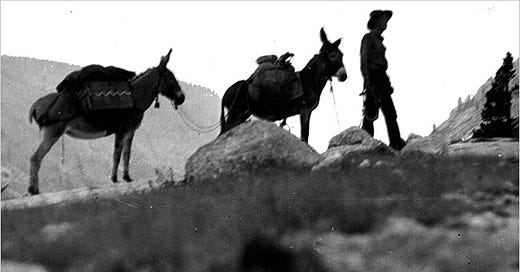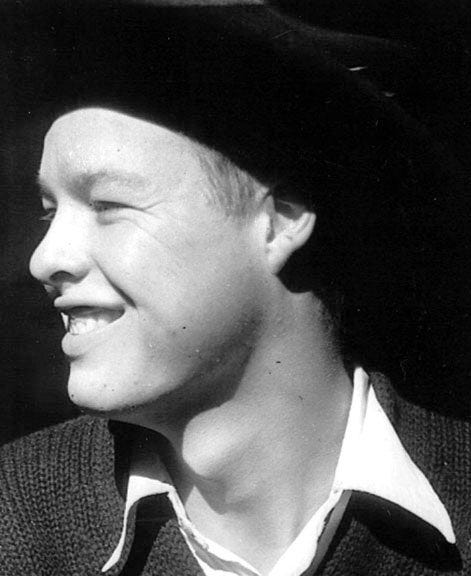“I must pack my short life full of interesting events and creative activity… I intend to do everything possible to broaden my experiences and allow myself to reach the fullest development. Then, and before physical deterioration obtrudes, I shall go on some last wilderness trip, to a place I have known and loved. I shall not return.”
— Everett Ruess
He was a young man with a craving for the ultimate, a complex man who refused to let his passions loiter in the cesspool of time. He was a wanderer with a poetic soul who danced with his dreams only to be consumed by their flaming embrace.
“...while I am alive, I intend to live.”
In the middle of the Great Depression, twenty-year-old Everett Ruess, an artist, poet, and adventurer, departed from the ranks of civilization and vanished somewhere in the remote canyons of Southern Utah. Almost a century later, his fate remains unknown despite numerous speculations.
John Nichols writes: [Ruess’s] determination to plod alone through the southwestern wilderness was so fierce and arrogant that at times he seemed to be utterly consumed…It is not that the man took leave of his senses, but rather that he was totally enflamed by a wonderful awareness of them.”
Everett Ruess was a clean-shaven, always-smiling young man whose well-kept appearance clashed with his vagabond spirit. He was born in 1914 to a good family. His mother was a talented Los Angeles Artist, and his father was a Harvard Grad and UCLA professor.
From a very early age, Ruess displayed a high degree of intelligence and artistic expression. He wrote poems and painted and had the capacity to see a little deeper than most.
One of his friends described him as the most “sensitive…intuitive person I have ever known. He could certainly see intrinsic and unspeakable beauty to a degree that could not always be put into words. But I can’t say whether or not he was a mystic.”
Everett’s fierce thirst for adventure took hold from a very early age and never left him. Like many artists, he wanted ultimate freedom to roam and wander and then to articulate these impressions through art.
Art needs life. As Thoreau reminded us, “How vain it is to sit down to write when you have not stood up to live.”
He was an ingenious, fearless young man who harbored a childlike curiosity. One day, the sixteen-year-old Everette left his Los Angeles home and hitchhiked up the coast of California. This was his first solo adventure. He shouldered his heavy backpack draped with a bedroll and made his escape, camping on the beaches and beneath the pines, making many friends along the way.
Ruess returned home to complete his high school education, graduating in early 1931. He was not interested in a career or a college degree. He tasted the freedom of the road and knew this was his destiny. A few weeks after his graduation, Ruess hitchhiked to a desolate area in Monument Valley with no money and few possessions. He roamed as a solitary figure in an unforgivable land and wrote down what his eyes had seen.
“Alone I shoulder the sky and hurl my defiance and
shout the song of the conqueror to the four winds,
earth, sea, sun, moon and stars. I live!”
The little we know about Ruess’s wanderings comes from his passionate letters to his family back home. We know that during his three-year sojourn, he ended up in San Francisco for a short time, where he mixed in and became a student of some well-established painters, photographers, musicians, writers, and bohemian political agitators. But the city life was a thorn in his soul, so he returned back to his beloved wilderness.
“God, How the wild calls me. There can be no other life for me but that of the lone wilderness wanderer. It has an irresistible fascination. The lone trail is the best for me.”
In all of Ruess’s letters, he expressed that he was happy despite the hardships and struggles of his vagabond life. Everett wrote in his last known letter home, “I don’t think I could ever settle down. I have known too much of the depths of life already, and I would prefer anything to an anticlimax.”
For years, Ruess rambled alone through the rugged lands of the West with his two donkeys to help carry the few possessions he owned. He found “splendid freedom” in his lonesome journies. “In solitude, I can bare my soul to the mountains unabashed. I can work or think, act or recline at my whim, and nothing stands between me and the Wild.”
Ruess found his true calling in the serene wilderness—regardless of how romantic and irrational it seemed. Alone in an open desert, campfires and moonlight, the red sand blowing in the wind, the daily sunrise, and the endless spectacle of clouds hovering in the blue skies, he was “one with the world.”
He lived with an allegiance to only two rules he set for his life: “Never count the cost, and never do anything unless you can do it wholeheartedly. Now is the time to live.”
In the autumn of 1934, Everett left the Grand Canyons and made his way north into the rugged terrain of southeast Utah. We don’t know if he had a plan. He might’ve wandered up the Colorado River, explored Bryce Canyon National Park, or taken some obscure trail to Lee’s Ferry.
It’s all speculation from this point.
All we know is that he vanished sometime in November. His last letter, dated November 11th, tells us he was alone deep in the land of red rocks and tall pines. “I have not seen a human being or any wildlife but squirrels or birds for two or three days.” He tells how he camped under the pines by a stream that “flowed under a towering orange cliff” and woke to a glorious sunrise.
And then he was never heard from again.
Some people think he might’ve fallen off a cliff. Fearless and a bit intrepid, he was prone to dangerous feats out on the trail. Perhaps he lost his footing. Others think he might’ve drowned and washed away in the Colorado River. Another theory is that he was murdered by two Navajos, who had a history of killing in this area, and his body was buried in some remote place in the desert. No one really knows.
But in the end, the story of Everett Ruess's brief life intertwines sorrow with a glimmering thread of inspiration and wonder, weaving a tapestry of dreams and despair. A wanderer and a seeker, this lone spirit plunged into life, and the enigma of his fate whispers loudest to those who roam the wild places he once tread.
Perhaps a hidden clue will one day unfurl, unveiling the mystery that shrouds his final journey.
But for now, all that endures of this romantic voyager are the fragments of his soul, etched in verse and color. Through his poetry's melody, his letters and essays, and the silent eloquence of his paintings, Ruess continues his timeless odyssey through the imaginations of all those who thirst for an adventurous life.
"Say that I starved; that I was lost and weary: That I was burned and blinded by the desert sun; Footsore, thirsty, sick with strange diseases; Lonely and wet and cold, but that I kept my dream!”
I’d like to end with a poem that the great Edward Abbey penned in 1983 in honor of this courageous young man who chased his dreams to the final horizon.
A Sonnet for Everett Ruess
You walked into the radiance of death through passageways of stillness, stone, and light, gold coin of cottonwoods, the spangled shade, cascading song of canyon wrens, the flight of scarlet dragonflies at pools, the stain of water on a curve of sand, the art of roots that crack the monolith of time. You knew the crazy lust to probe the heart of that which has no heart that we could know, toward the source, deep in the core, the maze, the secret center where there are no bounds. Hunter, brother, companion of our days: that blessing which you hunted, hunted too, what you were seeking, this is what found you.
Further reading:
Everett Ruess: A Vagabond for Beauty
Finding Everett Ruess: The Life and Unsolved Disappearance of a Legendary Wilderness Explorer
My work and research I put into this Substack Page are entirely reader-supported. If you enjoy the content I provide and are not ready to become a paid subscriber, you can simply make a one-time donation here at Buy Me A Coffee. If you can. I appreciate each one of you who follows this page. You all truly made it into a magical little online community. Thank You.






Wow, loved reading about him and how you put the story together! Hope you have a wonderful day!
Thank you, Erik. This touched me deeply.